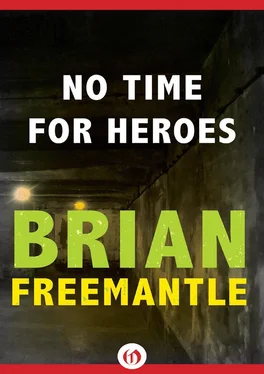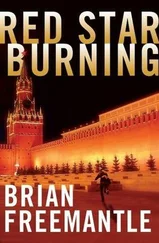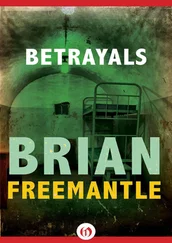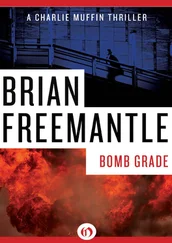Brian Freemantle - No Time for Heroes
Здесь есть возможность читать онлайн «Brian Freemantle - No Time for Heroes» весь текст электронной книги совершенно бесплатно (целиком полную версию без сокращений). В некоторых случаях можно слушать аудио, скачать через торрент в формате fb2 и присутствует краткое содержание. Жанр: Триллер, на английском языке. Описание произведения, (предисловие) а так же отзывы посетителей доступны на портале библиотеки ЛибКат.
- Название:No Time for Heroes
- Автор:
- Жанр:
- Год:неизвестен
- ISBN:нет данных
- Рейтинг книги:5 / 5. Голосов: 1
-
Избранное:Добавить в избранное
- Отзывы:
-
Ваша оценка:
- 100
- 1
- 2
- 3
- 4
- 5
No Time for Heroes: краткое содержание, описание и аннотация
Предлагаем к чтению аннотацию, описание, краткое содержание или предисловие (зависит от того, что написал сам автор книги «No Time for Heroes»). Если вы не нашли необходимую информацию о книге — напишите в комментариях, мы постараемся отыскать её.
No Time for Heroes — читать онлайн бесплатно полную книгу (весь текст) целиком
Ниже представлен текст книги, разбитый по страницам. Система сохранения места последней прочитанной страницы, позволяет с удобством читать онлайн бесплатно книгу «No Time for Heroes», без необходимости каждый раз заново искать на чём Вы остановились. Поставьте закладку, и сможете в любой момент перейти на страницу, на которой закончили чтение.
Интервал:
Закладка:
‘Maybe we should have taken the airport train,’ said Cowley. Why the fuck were they bothering with all the non-leak security in Moscow and Washington to become part of a circus like this, in the very place where they needed the most discreet security of all!
‘Much safer,’ agreed the DEA agent. ‘But no-one’s life is complete until they’ve had a ride in an Italian police car at a hundred miles an hour in traffic’ David Patton was a plump man cutting himself in half with a belt fastened too tightly around a lightweight suit that had long ago been defeated by pasta and Italian heat. That heat was troubling the man now, making him glow pink.
Everyone was at the early-curiosity stage Danilov had come to expect, looking at him as if they expected him to have one eye in the middle of his forehead or six fingers on each hand. He wished he could have satisfied them with some physical oddity.
Melega twisted to smile confidently from the front seat. ‘Everything is in place: it will be a perfect trap.’ He talked directly to Danilov, enunciating good English with elaborate slowness, as if talking to someone of limited intelligence.
Cowley’s concern at the security of the operation only partially lifted when the Italian planning was outlined in detail in Melega’s screened, bomb-proofed and electronically guarded headquarters. The man insisted only five people in total in both his controlling ministry and his anti-Mafia division knew a meeting of the Moscow Mafia and the Sicilian Cosa Nostra was anticipated. The two names from Kosov’s car telephone – Zimin and Zavorin – were on watch lists at all Italian air and sea ports. The reason had been disguised from Customs authorities by the order being issued through a ministry totally unconnected with Melega’s division. Five helicopters, each capable of carrying a fifteen-strong Carabinieri assault force, were on two-hour standby: so, too, were three naval patrol boats, which could transport a total of seventy-five men. To prevent any suspicion of a specific operation on a Mafia-dominated island, no additional officers had been drafted to Sicily itself, but there were fifty mainland Carabinieri who could be mobilised and helicoptered there in under four hours. None had yet been warned of their selection. Detectives and undercover operatives already on the island were listening to informers and sources, but not asking any questions to hint prior knowledge. Obviously there was no watch list for Zimin or Zavorin at either of Sicily’s Palermo or Catania airports: all incoming arrivals, apart from holiday charters, had to be routed through Rome.
Danilov pointed out that everything hinged on the two Chechen Family men travelling under their identified names in the first place, and flying direct to Rome in the second. From Moscow, even if they did keep their own names, they could arrive at any airport in Europe, travel on to Italy by train, bus or car and cross to Sicily by sea with practically no risk of detection. Although it meant dangerously spreading still more widely the two names, it was agreed Drug Enforcement Administration officers at American embassies in the relevant capitals create a watch list at the most likely transfer airports.
And they waited.
There were daily conferences, away from Melega’s possibly monitored office, in restaurants and hotels and ‘safe’ houses. At each, Cowley passed on what they received through the American embassy on the via Veneto, close to where he and Danilov were living, at the Bernini Bristol. Kosov’s car-phone interception continued to provide incontrovertible evidence of the man’s corruption, but nothing more about a visit to Sicily of two Moscow gangsters. Quantico established the voice on the first day of the interception was the same as that on the only tape discussing Sicily. The Sicilian tape had been enhanced to the point of destruction: none of the additional words, six in all, had added any useful material. The American technicians had been unable to decipher a trace-back number from the dialling tone without an identical Russian telephone: Snow had sent from Moscow a duplicate of every car telephone openly available in the city, which included two French and one German, but it was going to take time. If Kosov’s equipment was adapted from a European import of which they did not have a copy, a comparison was virtually impossible. Swiss police had not come up with any further information about the Russian named Ilya Nishin; neither had the FBI.
Each evening Patton and Smith tried to entertain them, which was an experience for Danilov and a comparison for Cowley, from his earlier tour of duty as the FBI resident in Rome. The first week Cowley said nothing seemed to have changed in six years, to which Patton replied laconically that nothing had changed in Rome for two thousand years, which was why it was called the Eternal City. Most nights they finished at bars along the via Veneto, which was hardly typically Italian but a place where they all felt comfortable, despite the prices. Never once did Cowley get drunk: several nights he did not drink at all. In the middle of the second week Barclay Smith, who did get drunk most nights, insisted he’d waited a long time to say it but it looked to him like either a bum steer or the bastards had been and gone without them knowing about it. Patton mumbled that he thought so too. Neither Cowley nor Danilov felt like arguing. At the end of that week there was the first suggestion of impatience from Washington, in a personal message from Leonard Ross to Cowley asking how much longer he felt the stake-out justified. There was no indication in the cable of political pressure, but Cowley guessed there was some when Melega raised virtually the same query at that day’s conference. The question created the first worthwhile discussion between them for more than a week, opinion ending almost equally divided between the called-off theory and the been-and-gone suggestion.
‘It was always on the cards it would be a blow-out,’ said the world-weary Barclay Smith. ‘How many of these things ever come up with a result? One in ten? One in twenty? Like Caesar said, we came, we tried, we fucked up, so let’s call it a day.’
Cowley refused to, immediately. Danilov argued against it as well, both accepting they were clutching at straws because there was nothing else to clutch at, anywhere. Danilov finally got his hair cut and bought three new shirts. He considered another jacket but decided to save the money: he’d already converted his lire advance into $200, and thought he could accumulate the complete bribe for the Tatarovo apartment from incidental expenses. He saw a watch he would have liked to buy to replace the one which rarely worked, but ignored that purchase for the same reason.
It was the next Wednesday that an excited Colonel Melega announced rumours from two independent sources in Palermo – like the Moscow tape, insufficient when separate but intriguing when put together – of a forthcoming meeting of Mafia leaders. A third source, from Catania, confusingly suggested it would be between Sicilian and American dons, with no mention of Russians. Two of the informants put the timing within the next seven days.
On the Thursday, the priority cable to the Rome embassy from the Paris DEA office reported a Maksim Zimin and an Ivan Zavorin transferring from an incoming Moscow flight to an Alitalia service. The alert was so prompt there was still an hour before the Alitalia plane landed at Fiumicino. By the time it did, Colonel Melega had established the Russians were booked for their second transfer connection, still confidently under their own names and with only a ninety-minute stopover, on the local flight from Rome to Palermo. When it took off, six of the new passengers were members of Melega’s anti-Mafia squad, the two Russians already secretly photographed and identified from the immigration documents they had surrendered in Rome and upon which both were described as company directors.
Читать дальшеИнтервал:
Закладка:
Похожие книги на «No Time for Heroes»
Представляем Вашему вниманию похожие книги на «No Time for Heroes» списком для выбора. Мы отобрали схожую по названию и смыслу литературу в надежде предоставить читателям больше вариантов отыскать новые, интересные, ещё непрочитанные произведения.
Обсуждение, отзывы о книге «No Time for Heroes» и просто собственные мнения читателей. Оставьте ваши комментарии, напишите, что Вы думаете о произведении, его смысле или главных героях. Укажите что конкретно понравилось, а что нет, и почему Вы так считаете.












